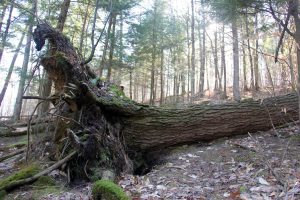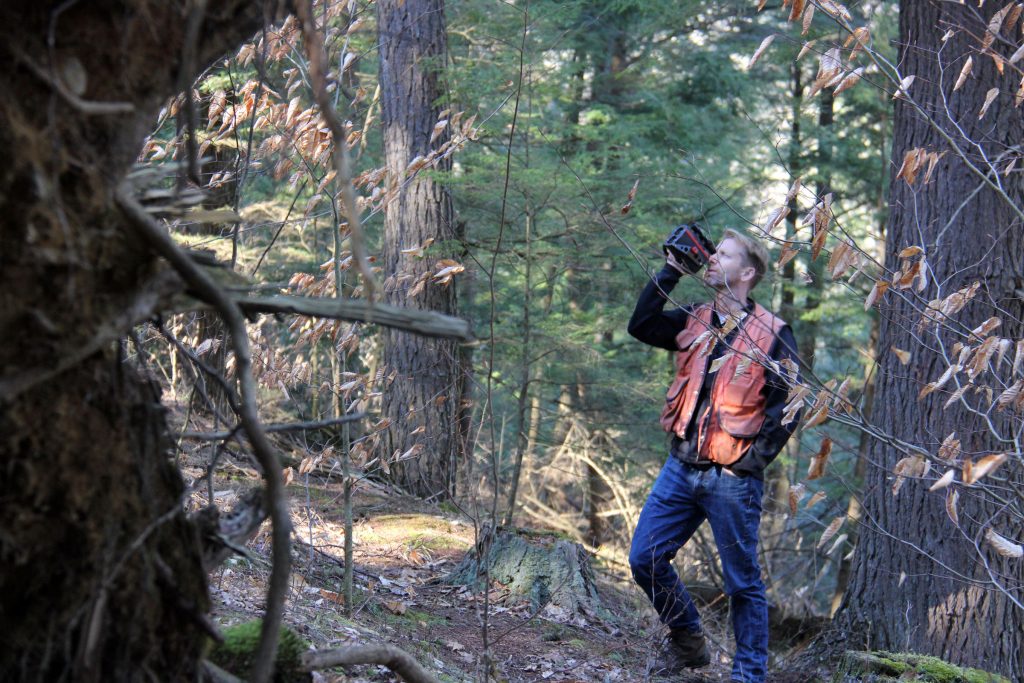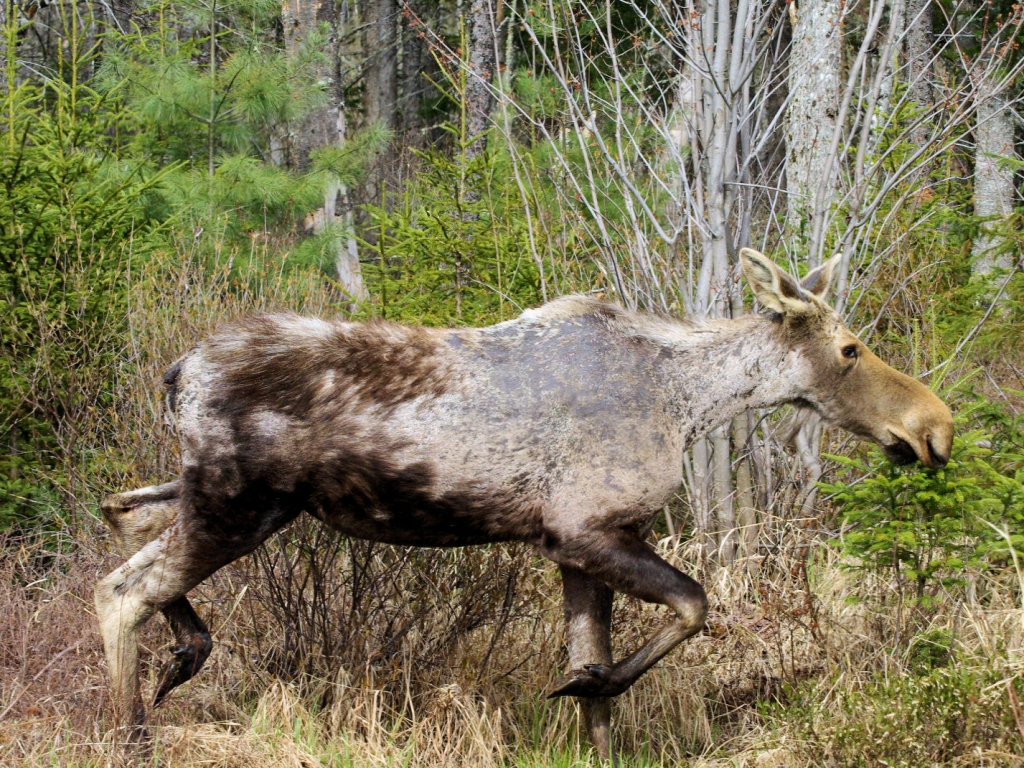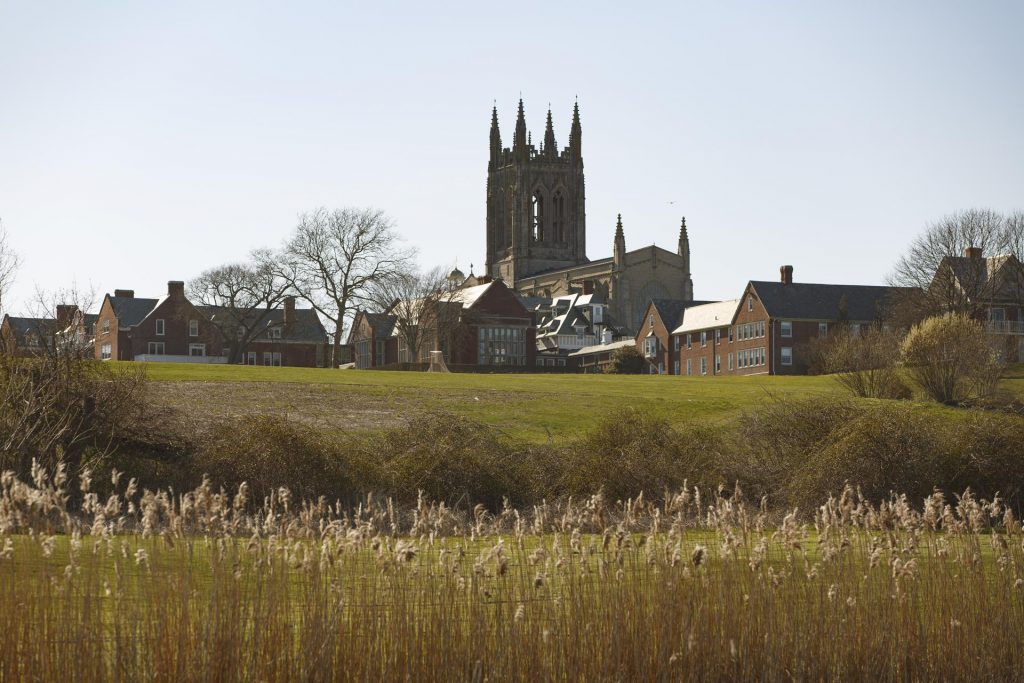Episode 44: Uncovered (Updated)

This week, we hear a few updates on stories from our archives. The Boston Globe Spotlight team shines light on sexual abuse at elite New England boarding schools, and it prompts more investigations and more allegations. Plus, we follow scientists who are recreating ancient forests, and tracking the effects of climate change on moose. And we hear about a program at a rapidly-diversifying New Hampshire high school that aims to build understanding between American-born students and newcomers.
Engineering Forests, Tracking Fading Moose
In the northeastern U.S., there is less than one percent of old growth forest left. A new University of Vermont study found that harvesting trees in a way that mimics ancient forests not only restores critical habitat, but also stores a surprising amount of carbon.

Researchers created this tip-up mound by pulling over this tree with a cable. A downed tree offers a number of habitat niches for small mammals, insects and invertebrates. Photo by Kathleen Masterson for VPR
For a forest to be considered “old growth,” it must grow largely undisturbed, usually for several centuries. These ancient forests help foster biodiversity of plants, animal and even fungi — and can help mitigate flooding.
University of Vermont ecologist Bill Keeton wanted to see if he could take a “middle-aged” New England forest and “nudge” the forest ecosystem into old growth conditions. Vermont Public Radio reporter Kathleen Masterson went to take a look.

UVM forest ecologist Bill Keeton uses a laser rangefinder to measure the height of a tree in UVM’s Jericho Research Forest.
The 1990s were a good time to be a moose in New Hampshire. The animals could take advantage of a perfect mix of young and mature forest, and plenty of food. At its peak, the statewide population reached 7,400. But given the lush habitat, scientists wondered why the moose population wasn’t growing faster.
Today, there are only about 3,400 moose in New Hampshire, and the same steep decline is being reported in neighboring Vermont and Maine.
The culprit? A nasty tick whose proliferation is brought on by climate change.
We speak with Kristine Rines, a wildlife biologist with the New Hampshire Fish and Game Department. Rines is leading a four-year study to learn more about how weather changes and forest management practices affect the moose population.
Painful Secrets Continue to Come to Light at New England Boarding Schools
Another New England private school has come forward with a report detailing sexual abuse of students by staff over decades. Last month, St. Paul’s School in Concord, New Hampshire released a report naming 13 former faculty and staff members.
According to investigators hired by the school, accusations of sexual misconduct against the 13 — which ranged from inappropriate touching to repeated rape — had been substantiated. The report also includes accounts of misconduct by 10 additional unnamed faculty members. The alleged abuse took place between 1948 and 1988.

Steven Starr, a former student at the Fessenden School in Newton, Mass., shows photos of him at 11 taken by teacher James Hallman, who Starr says molested him. Image courtesy of The Boston Globe Spotlight Team.
St. Paul’s is the latest school to release its own findings since a Boston Globe Spotlight investigation last year revealed allegations of sexual abuse at more than 67 private schools in New England. Choate Rosemary Hall in Wallingford, Connecticut named 12 alleged abusers in a report released in April.
Joining us is Jonathan Saltzman, a reporter on the Globe Spotlight Team who took part in the investigation. Saltzman also worked on several follow-up pieces, including an article on the report from St. Paul’s School in Concord. We recorded our conversation in April.
A Home for Homeless Women Veterans; A Global Outlook at Concord High

Army veteran LouAnn Hazelwood was fleeing her second abusive marriage when she found one of the nation’s few transitional programs for homeless female veterans. Photo by Rebecca Sheir for the American Homefront Project
Women make up nearly 15 percent of the U.S. Armed Forces. As more females return from service, many are at special risk of becoming homeless due to mental health problems, substance abuse, and military sexual trauma.
As a result, females are the fastest growing demographic of homeless veterans.
But nearly all facilities for homeless veterans house males and females together. That can be counterproductive for women recovering from trauma.
In Leeds, Massachusetts, freelance reporter Rebecca Sheir introduces us to one of the nation’s few programs that caters exclusively to the needs of females.

Social worker Anna-Marie DiPasquale with student Rene Ndutiye at Concord High School. Photo courtesy of Anna-Marie DiPasquale
Ten years ago, the demographics of New Hampshire and of Concord High School were almost identical. Both were 93 percent white. While that number has remained steady for the state, the capital city’s high school has diversified in a big way. More than 10 percent of the school’s 1,600 students are now refugees resettled from 66 countries.
Anna-Marie DiPasquale, the school’s social worker, started a new project this past fall called Travel Around the World. The project allows Ms. DiPasquale to visit different classrooms with small groups of refugee students sharing their cultures and traditions firsthand. Jimmy Gutierrez reports for New Hampshire Public Radio’s Word of Mouth.
About NEXT
NEXT is produced at WNPR.
Host: John Dankosky
Producer: Andrea Muraskin
Executive Producer: Catie Talarski
Digital Content Manager/Editor: Heather Brandon
Contributors to this episode: Kathleen Masterson, Rebecca Sheir, Jimmy Gutierrez
Music: Todd Merrell, “New England” by Goodnight Blue Moon,
We appreciate your feedback! Send praise, critique, suggestions, questions, and story leads to next@wnpr.org.



